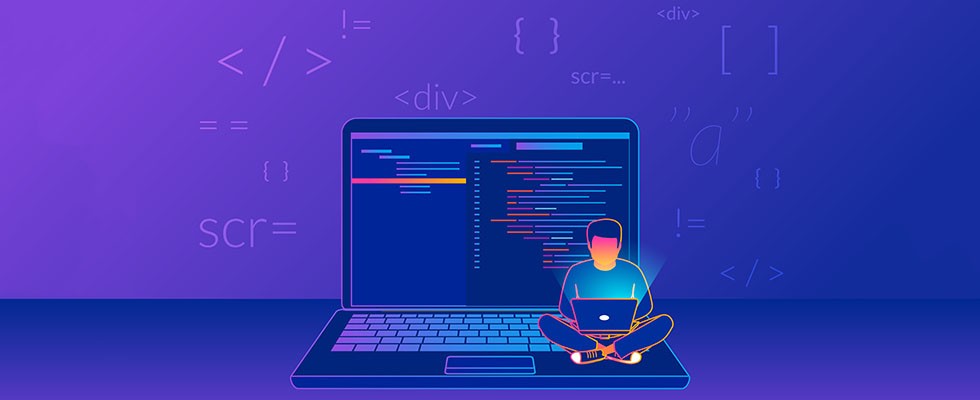5 Ways Coding Skills Can Be Applied in Any Industry

Why coding is a vital skill no matter where you work.
In 2019, more businesses than ever before are looking to hire smart, technologically proficient candidates. As advances in technology increase, a growing number of industries are relying on computer systems and software to help manage their data and achieve their goals, making coding skills more of a necessity than it has ever been.
Many people think that coding is a niche that only applies to specific tech-related jobs. However, now more than ever, coding is a vital skill that can be used across the board to benefit your company, and yourself, regardless of where you work. Here are five ways that coding can be used in any context:
1. Websites
If you don’t have a website, you don’t exist.
That may sound like an exaggeration, but nowadays, a business or service that can’t be found online probably won’t be found at all. Companies are increasingly choosing to eliminate brick-and-mortar costs by going completely online.
However, those shops and restaurants that you can still walk into rely on search results, map listings, and any number of online references to drive interest.
This means that one of the first things a business in any industry needs to address is online presence, and the best way to do this is through a good website. Having a competent web developer onboard means that setting up a website is quick and inexpensive, and a good coder can continuously update and manage the site as needed.
2. Apps
In 2019, more than 2.5 billion people will own a smartphone. That’s 2.5 billion people who can potentially find your business online, and 2.5 billion people who could download your app.
An app is like the cool uncle to the website: more friendly and accessible, and a lot more fun. David Dodge, CEO of Codakid, puts it this way:
“If your only connection to people is through your website, then you’re relying on people heading to your page and checking in often, and that’s pretty unlikely. With an app, you’re right there on their home screen and can update them with notifications, alerts, and special offers. Plus, a well-designed app can be an enjoyable user experience and can offer tools that your website can’t.”
Coding skills are essential to developing apps, and a well-made app can help connect to people in a much deeper way than a website can. Banks have their own mobile apps to make financial transactions easier, and educational apps can make learning to code fun for kids. These are just a few examples—in truth, companies in any industry can offer apps for a more personalized experience.
If that’s not reason enough to consider improving your coding skills, know that apps can also be monetized either with a single purchase or in-app transactions. Thus, having the coding skills necessary to create an app can be a financially smart move.
3. Busywork
Regardless of which industry you work in, you probably use a computer for some tasks. Whether it’s responding to emails, dealing with data, or making spreadsheets, a lot of work done on the computer can take a long time and be pretty mind numbing. That’s where coding comes in.
Using Python, it’s possible to automate tasks that would otherwise take up a lot of valuable time. Even rudimentary coding skills can allow you to create new shortcuts that combine several key or mouse commands into one action, saving you time and energy. Instead of scanning pages and pages of PDFs or Excel spreadsheets, what if you had a few lines of code that could pick out the important information you need?
Even if the industry you work in isn’t heavily reliant on data, coding skills can help you enable automatic email responses, set alerts on price changes in your market, and many other useful things. Small amounts of time spent doing busywork add up, and coding knowledge allows that time to be spent on more interesting and useful things, making any industry more productive.
4. Troubleshooting
The name of this section alone might already be stressing people out. For anyone who has ever spent hours on a phone line trying to figure out why their computer keeps crashing or emails won’t send, dealing with software glitches can be downright awful. Simple errors can often be confounding and lead to hours of extra work.
Having someone with even a basic knowledge of coding skills onboard can spare those marathon IT support calls. Many common computer bugs have a simple fix, and something that could take customer service hours to identify and solve can be dealt with quickly and effectively by someone with software experience.
While lines of C++ or JavaScript can look like a foreign language to the uninitiated (because they are, in a way), they’re easier to understand and deal with for anyone who has learned the basics of programming. In situations like these, the person in the office who knows how to fix the issue becomes incredibly valuable. And who knows? Maybe there’s a promotion in their future!
5. The Coding Industry
Any list of ways to apply coding skills in 2019 would be incomplete without talking about the coding industry itself. A report from Burning Glass shows that coding jobs are growing 12% faster than the market average, and that jobs requiring coding pay on average $22,000 a year more than those that don’t.
Not only do coding skills lead to better job prospects in all industries, but software development also specifically had 1.3 million open jobs as far back as 2016. Related technical industries boast similar numbers. That speaks volumes about the importance of learning to code for a promising future career. Even if coding isn’t your main gig now, there will always be a job in the industry waiting to be filled.
When Should You Develop Coding Skills?
The short answer? Now.
While the software industry is expanding, practically every kind of job in the digital age can benefit from basic coding skills. Whether you’re a teacher, scientist, farmer, or anybody else, coding’s for you.
Best of all, coding is such a huge topic that there will always be something new to learn that will expand upon your knowledge.
To get started on your technological journey, be sure to look into some SQL Basics courses to help you communicate and work with lots of different types of data.






